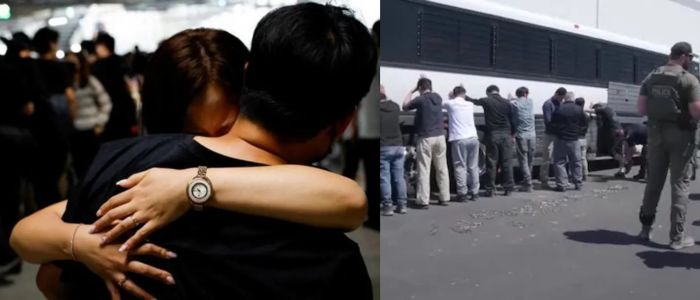Government Action and Investigation
On Monday, a spokesperson for the president confirmed South Korea has taken up its concerns formally with the United States. South Korean officials are cooperating with the appropriate companies to evaluate whether any human rights were violated in connection with the operation and detention.
"We will investigate any possible human rights violations and other issues," said the spokesperson, noting that the South Korean government plans to protect the rights and interests of its citizens employed abroad.
More than 300 South Korean workers returned to South Korea on Friday after spending a week in detention following the raid. The raid was at an electric vehicle battery plant in Georgia.
Many of the South Korean workers were sent to the United States to assist with the setup of the facility, and this practice, the South Korean officials emphasized, is a normal procedure for companies expanding production to other countries.
The spokesperson called the situation "baffling," emphasizing how out of the blue the raid was for both workers and employers.
The government noted that if strict compliance with local laws is the goal here, then dignity and fairness need to be maintained in compliance decisions.
Details of the Raid and Its Consequences
The raid took place on 4 September at a Hyundai-run facility in Georgia. Approximately 475 individuals, most of whom were South Korean citizens, were taken into custody. It was the largest immigration raid conducted at a single location since U.S.
President Donald Trump's administration commenced a national crackdown on unauthorized migration and undocumented immigration a few months earlier. Immigration and Customs Enforcement (ICE) reported that the individuals detained were either working without authorization in the United States or had overstayed their visas here.
Eyewitnesses reported panic and chaos when the federal agents landed at the plant, with workers being led away in handcuffs, and not much in terms of advance warning was given. Additionally, the abrupt raid disrupted the plant operation, but it also raised broader questions about the treatment of foreign workers.
Hyundai subsequently announced that the opening of the facility would be delayed by at least two months, demonstrating the economic impact of the raid on the company.
However, temporary interruptions in the work of the plants aside, this event endangers the partnership between the two countries. The question becomes how much, if anything, could an event like this alter all of the planned South Korean dollars in a matter of billions of investments into the United States?
The investments are important to both countries as South Korea continues to expand its global industrial capacity and the United States attempts to create a distinct manufacturing capacity here for our own 'domestic' requirements for electric cars, for example. Government and United Auto Workers Reactions
Representatives of the South Korean labor movement have asserted that President Trump should apologize publicly for the raid. Their case is that the detention of workers, who were mainly doing work as constructors of factories, was not only disrespectful, but will unwittingly create a negative start, as well, for international businesses to cooperate.
To counter the events of the raid, President Trump has sought to calm the anxious foreign investors. He stated that foreign professionals and South Korean workers are "welcomed" in the United States, and he made the point that the last thing he wants to do is to scare anybody away from investing in the U.S.
On his Truth Social site, Trump stated, "We welcome them, we welcome their employees, and we shall proudly say that we have learned from them, and that in their own 'game', we will do even better than them, sometime in the not too distant future.
Negative Effect on Bilateral Relations
The raid has highlighted this tension with what is otherwise a strong relationship with South Korea, a long term ally with strong security-based ties, and an established economic relationship.
Although the two countries are aligned in most respects, such incidents create challenges for the management of cooperation, and toil efforts, however subtly, to regulate immigration enforcement, or labor mobility.
The South Korean commitment to investigate this matter illustrates the increasing domestic pressures to examine the duty to explore contracts for foreign deployed workers, particularly in developing industries and high-profile developments such as electric vehicle development.
From the perspective of Washington, it would be maintaining and enforcing immigration obligations without compromising foreign investment, on which new jobs and new technology depend.
While the investigations may be pending for a while, both governments will still feel the pressure to explain how foreign workers in crucial industrial expansions are accorded some measures of transparency.
For South Korean workers and family members, there is, however, the hope that the lessons learnt from the episode help ease the disruptions and entrench rights for their overseas deployments.
















